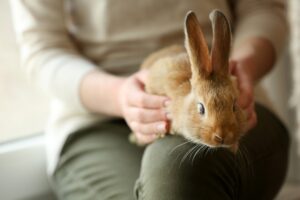If you are a new rabbit owner, you may be wondering how to properly care for your furry friend. Many people mistakenly believe that rabbits are low-maintenance pets, but in reality, they require as much time, effort, and money as dogs or cats. Rabbits need a well-balanced diet, a clean and spacious living area, mental stimulation, and daily companionship. If you want to give your rabbit the best possible care, it’s essential to understand their specific needs and behaviors.
In this guide, we’ll explore everything you need to know about caring for your pet rabbit, including how to interact with them, how to set up their home, and how to ensure their well-being when you’re away.
Why Rabbits Need Daily Attention and Love
Rabbits are social animals that crave companionship and mental stimulation. If they are left alone for extended periods, they can become lonely and even depressed. While some rabbits bond well with humans, others need the company of another rabbit to feel happy and secure. If your rabbit is the only pet in the house, you should aim to spend a minimum of three hours per day interacting with them.
Ways to Bond with Your Rabbit
 There are many fun and engaging activities you can do with your rabbit to strengthen your bond. Rabbits enjoy playing with simple household items such as cardboard tubes, phone books, and rolling toys. You can also create obstacle courses or provide them with puzzle toys to stimulate their minds.
There are many fun and engaging activities you can do with your rabbit to strengthen your bond. Rabbits enjoy playing with simple household items such as cardboard tubes, phone books, and rolling toys. You can also create obstacle courses or provide them with puzzle toys to stimulate their minds.
If you lead a busy lifestyle and worry about spending enough time with your rabbit, you may want to consider getting another rabbit as a companion. However, you should introduce them slowly and house them separately at first to prevent territorial aggression. Rabbits don’t naturally share their space unless they have been properly bonded.
Understanding Rabbit Behavior and How to Interact with Them
Although rabbits look soft and cuddly, they are not always fond of being picked up or held. In the wild, rabbits are prey animals, and being lifted off the ground can trigger their instinct to flee or struggle. If a rabbit feels confined, they may react with fear and panic, leading to possible injuries.
How to Properly Pick Up a Rabbit
Since rabbits are delicate animals, they must be lifted and handled correctly. If they feel insecure while being picked up, they may struggle to the point of breaking their own back. Here’s the proper way to lift your rabbit safely:
- Gently scoop your rabbit with one arm along their side.
- Support their rear end with your other hand.
- Hold them close to your body for reassurance.
If your rabbit dislikes being lifted, try sitting on the floor with them and allowing them to hop onto your lap instead. Rabbits feel much safer when their feet are touching the ground.
Helping Kids Interact Safely with Rabbits
If you have children at home, it’s crucial to teach them how to handle the rabbit gently and respectfully. Loud noises, sudden movements, or being chased can make a rabbit feel threatened. Young children should always interact with rabbits under adult supervision to prevent accidents.
Creating a Comfortable Home for Your Rabbit
Your rabbit’s living space should be roomy, clean, and safe. Contrary to popular belief, small cages are not suitable for rabbits. Instead, opt for a large enclosure, an exercise pen, or even a bunny-proofed area in your home where your rabbit can move freely.
Choosing the Right Bedding
Since rabbits have individual preferences, you may need to experiment with different bedding materials to find what your bunny likes best. Common bedding options include:
 Shredded paper
Shredded paper- Straw or hay (comfortable and edible)
- Soft fleece blankets
- Recycled paper bedding
Avoid using pine or cedar shavings, as these can produce harmful fumes that irritate a rabbit’s respiratory system.
Providing a Proper Litter Box
Rabbits are naturally tidy animals, and many can be litter-trained just like cats. Select a large, low-entry litter box that your rabbit can comfortably fit inside. Fill it with rabbit-safe litter, such as:
- Recycled paper pellets
- Shredded newspaper
- Hay or straw
Avoid clay-based or clumping cat litters, as ingesting these can cause serious health problems for rabbits.
Feeding Your Rabbit a Healthy Diet
Proper nutrition is key to keeping your rabbit healthy. Their diet should primarily consist of fresh hay, leafy greens, and high-quality rabbit pellets.
Best Foods for Rabbits
- Hay: The majority of a rabbit’s diet should be fresh hay, such as Timothy hay, orchard grass, or oat hay. Fiber from hay is essential for proper digestion.
- Leafy Greens: Rabbits enjoy a variety of fresh greens. Safe vegetables include:
- Romaine lettuce (avoid iceberg lettuce, which has little nutritional value)
- Kale and collard greens (feed in moderation due to calcium content)
- Cilantro, parsley, and basil
- Carrot tops and beet greens
- Bok choy and Brussels sprouts
- Pellets: Choose a high-fiber pellet with no added dyes or seeds. Feed in moderation to prevent obesity.
Foods to Avoid
Some foods are harmful to rabbits and should never be given, including:
- Sugary fruits (only offer small portions as occasional treats)
- Avocados or onions (toxic to rabbits)
- Processed or human food
- Nuts, seeds, or grains
Providing fresh water daily is also crucial. Use a sturdy ceramic bowl or a hanging water bottle, making sure it is refilled and cleaned frequently.
Letting Your Rabbit Explore Outside the Cage
A rabbit that is confined to a cage 24/7 will become bored and unhappy. It’s best to give your rabbit several hours of supervised playtime outside their enclosure each day. Before letting them roam, be sure to:
- Rabbit-proof the area by covering electrical cords, blocking small spaces, and removing any dangerous items.
- Provide hiding spots and tunnels for your rabbit to explore.
- Use pet-safe flooring if your rabbit is kept indoors on slick surfaces, as they may slip or struggle with traction.
If you allow your rabbit to play in an outdoor area, always supervise them carefully to protect them from predators, extreme temperatures, or toxic plants.
What to Do When You’re Traveling
Since rabbits require daily care, you should never leave them unattended for extended periods. If you need to go out of town, make sure you have a trusted pet sitter who understands rabbit care. Rabbits can experience stress if their routine is disrupted, so finding a knowledgeable pet sitter is crucial.
 A professional pet sitter will ensure that your rabbit receives:
A professional pet sitter will ensure that your rabbit receives:
- Fresh food and water daily
- Clean bedding and litter box maintenance
- Interaction and playtime to prevent loneliness
- Safety checks to monitor their health and well-being
Final Thoughts on Rabbit Care
Owning a rabbit is a rewarding experience, but it requires dedication, patience, and a commitment to daily care. By understanding your rabbit’s needs and providing them with companionship, proper housing, and a healthy diet, you can ensure that your pet lives a long and happy life.
If you ever need professional pet sitting services to care for your rabbit while you’re away, consider reaching out to an experienced pet sitter. Whether it’s daily feeding, cleaning, or companionship, a trusted pet sitter can give your rabbit the attention they need to stay comfortable and secure.
For more information about reliable rabbit care services, contact Paw Pals Pet Sitting today.


